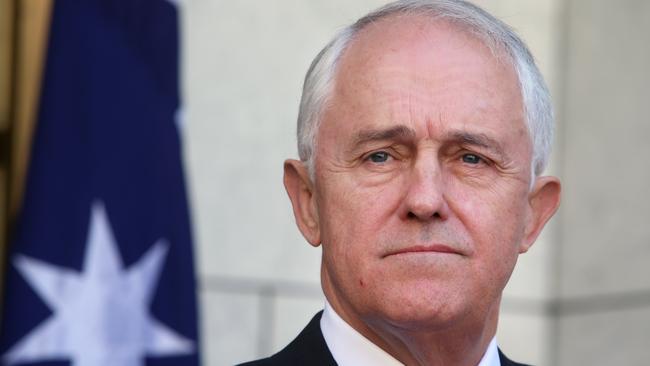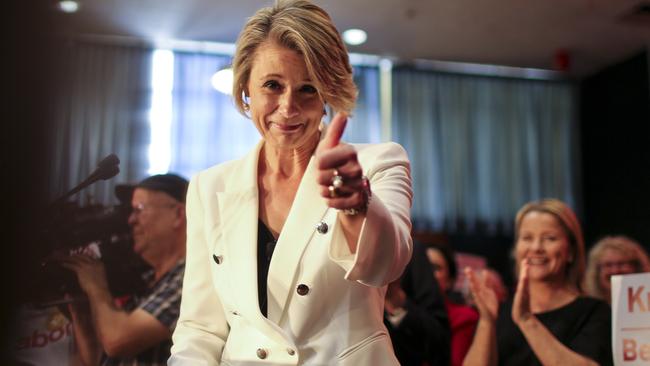Voters aren’t tired of politics, they want more say
HERE’S a memo to politicians: it’s not democracy people are sick of, it’s political games, writes Parnell Palme McGuinness.

Rendezview
Don't miss out on the headlines from Rendezview. Followed categories will be added to My News.
THE idea that voters are turning off democracy is a massive furphy.
In fact, we’ve never wanted it more. It’s just we’re having trouble getting as much as we want.
Take the recent so-called non-binding survey on marriage equality.
The same-sex marriage survey gave all Australians the opportunity to debate and express a position on an issue which is bigger than politics.
It’s a great rejoinder to the common refrain that politicians are out of touch and people are losing faith in politics.
People who recite this cynical line about our democratic ideals are often fond of quoting data such as a recent Lowy Institute study which found that 40 per cent of millennials don’t believe that a democratic system is preferable anymore.
Such results have been echoed by other studies in other advanced democracies, suggesting that the pluralist politics of the West are in trouble.
Yet in Australia, 80 per cent of eligible voters responded to the voluntary same-sex marriage survey — including full 70 per cent in the supposedly disengaged millennial age bracket.
That’s as many as turn out to cast their compulsory vote in elections.
It shows that if anything there’s a huge appetite for democracy — and Australia isn’t alone.
Germany was finally set to get a government last weekend, a month after the federal election.
But it turns out that while the conservatives and the economic liberals have plenty in common, negotiating budget and immigration control with the Green Party, which is necessary to make up numbers, is just about impossible.
German politicians brought this bind on themselves. German voters clearly marked out a third party, the AfG (Alternative for Germany), which the majors won’t deal with.
Closer to home, Queensland is heading towards its own version of the German problem.
One Nation has polled as high as 30 per cent in some regions of the state. Premier Annastacia Palaszczuk says she’d rather be in opposition than make a deal with the populist party, which is exactly what the major German parties said about AfG too.
The German electorate’s response was fine, opposition it is then. The incumbent conservatives were marked down 8.5 per cent and are now supported by only a third of Germans.
The social democrats were bombed back into oblivion with under 20 per cent of the vote.
The Alternative for Germany is a breakaway group of conservatives that was originally formed to oppose Germany’s embrace of the European Union, but found popularity through its opposition to Chancellor Angela Merkel’s unconsultative welcome policy in the face of massive migration.
The AfG experienced a spike in support as Germans discovered that economic and welfare migrants were mixed among, and often exceeded the numbers of, Syrian refugees.
Both the AfG and One Nation have said a lot of silly things and fielded some pretty unsavoury candidates. But they continue to attract support from voters who feel that the major parties are no longer listening to them.
The German major parties are now trying to address the issues they think they were punished for.
When the German head of state visited Australia earlier this month, a priority was learning more about the successful Australian model of controlled immigration and deliberate integration.
But they’re ignoring another popular demand of the AfG: Swiss-style referendum voting on issues that don’t cut across simple ideological lines.
So here’s a memo to politicians: it’s not democracy people are sick of, it’s political games. They’re sick of you banging on about the stuff that matters to you and your party’s grip on power, or attempt to obtain it. More democracy is the answer. Give people more of a say.
The alternative is more minor parties, and not just on the right.
The Australian Greens has announced it intention to take 25 seats in federal parliament over the next generation.

The consequence would be an escalating hostage politics from the political extremes.
A party room vote on same-sex marriage would have been a nonsense because many elected representatives are at odds with their electorates on the issue.
The Western Sydney electorates represented by Labor pollies who would have been bound to vote Yes are the most obvious example.
Some issues just don’t fit within an ideological framework.
The frameworks are crumbling too as parties vie to be all things to all people. Remember in 2007 Kevin Rudd got elected to be the same as John Howard… but different. That didn’t go so well for him.
The sudden increase in boat arrivals was the most dramatic example of what can happen when you try to achieve the same policy differently.
It didn’t work. Fifty thousand times. It’s a bit like trying to achieve budget repair without cutting spending. There’s a chance it can be done, but it’s more likely to work the way it’s succeeded before.
At the same time as political parties grab each other’s policies “but different” to attract swing voters, they wonder why populism is on the rise. The established political class can’t make head or tail of the ideological mishmash that people seem to get enthused about these days.
But what they’re offering is often exactly that dolled up in the old team colours. It is time for politics to get back in touch.
For a quarter of NSW politicians, including the Bennelong candidates, moving into the electorate they claim to represent would be a good way to start. Finding new ways to listen and respond isn’t rocket science in a multimedia age.
The brightest moments of the same-sex marriage survey process were found in the genuine conversations that replaced parliamentary pointscoring. We need more of them.
Australia isn’t the first nation to discover we need more democracy to solve the democracy we’ve got. But the marriage plebiscite might just have hinted at a way that works for us.
Parnell Palme McGuinness is managing director of Thought Broker.


